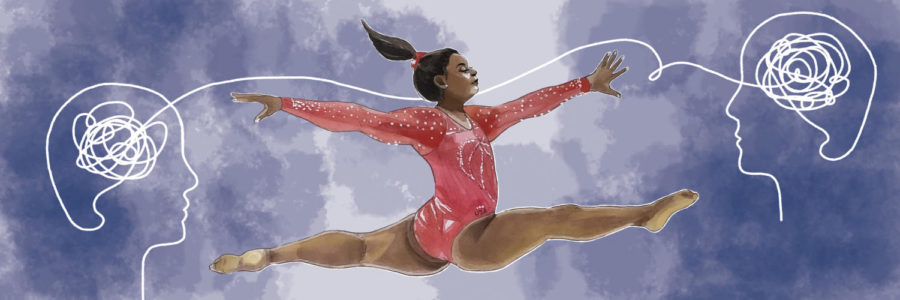Athletes deserve respect when dealing with injury — mental or physical
Due to mental and physical health complications, as well as overall pressure to perform at such a high level, U.S. Olympic gymnast Simone Biles withdrew from individual all-around competition at the Summer Olympic games on July 27, 2021,.
Surrounded by hoards of press at her withdrawal announcement, Biles told reporters, “I do not trust myself anymore. I have to focus on my mental health.”
Critics were quick to rip apart the athlete across all social media platforms.
“We are raising a generation of weak people like Simone Biles.”
“Sorry, Simone Biles, but there’s nothing heroic or brave about quitting because you’re not having ‘fun’.”
“Contrast this with our selfish, childish national embarrassment, Simone Biles,” Texas Deputy Attorney General Aaron Reitz commented on a retweeted video of injured 1996 American Olympic gymnast Kerri Strug competing.
Biles took the onslaught of criticism with grace and determination to raise awareness of mental well-being of athletes, and the issue faded away as news outlets began to ignore the event and instead focus on the next big story.
What cannot be ignored is the general reaction from the masses who have not experienced the “twisties” while completing difficult skills on the international stage during a pandemic.
Athletes experiencing injuries, whether physical or mental, face the challenge of having to grieve a version of themselves in which their entire identity, schedule and lifestyle revolved around their respective sport.
According to Allison & Meyer, Mihovilovic, and Werthner & Orlick, previous research indicated 14% to 32% of competitive athletes are forced to retire because of a career-ending injury.
This staggering number represents only competitive athletes who are forced to retire from injury and does not include those who push through injury regardless of any repercussions.
Undergoing serious injury as an athlete can fundamentally, “imperil one’s belief system, self-concept, values, commitments, emotional stability, and the ability to function socially, occupationally, or both,” according to Ford & Gordon.
If the effects of physical injury are so harrowing and taken so seriously, why were so many so quick to denounce the legitimacy of Biles as the “Greatest of all Time” because of her prioritization of her own health?
According to Athletes for Hope, up to 35% of elite athletes suffer from a mental health crisis which may manifest as stress, eating disorders, burnout or depression and anxiety. This hardly accounts for the individual difficulties Biles has faced as not only arguably the most talented gymnast in history, who has had to deal with being scored unfairly due to her skill’s difficulty and the sexual assault trauma from her time under the coaching of Larry Nassar.
Bile’s bravery has clearly exposed the lack of seriousness toward athletes’ well-being. While athletes constantly push their bodies and minds to their absolute limits, they are somehow expected to ignore the very real — and very common — mental battles that come alongside physical injury or taking part in the sport in general.
Elite athletes are constantly faced with the difficulty of maintaining peak mental and physical health to perform at high levels, and while social media critics may be fighting off other Twitter users, these internet battles hold little weight when compared to the battle an athlete must undergo in their own mind when faced with an injury that could potentially strip them of their entire identity.
Although commenting on the “grit” of an athlete struggling mentally may seem only natural when the ability to project your opinion to millions on Twitter is so easy, it’s time that the seriousness of athletic injury — both physical and mental — is considered, and that the athletes themselves are treated with the respect and compassion needed while grappling with life-altering realities.

Charlie Trent is editor-in-chief and is a senior. It is her fourth year on staff. In school, she is involved in Chambers singers as Dance Captain and Choir...




